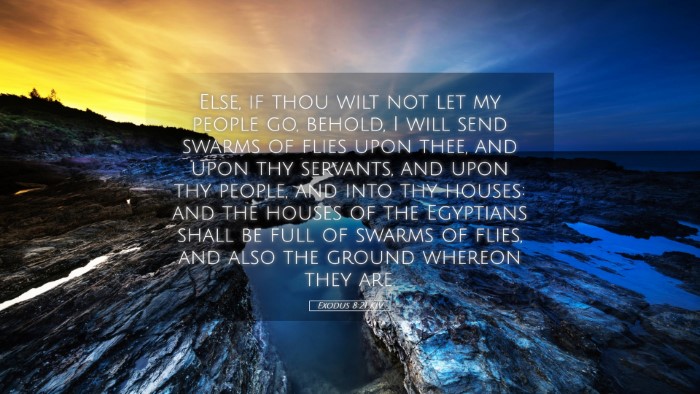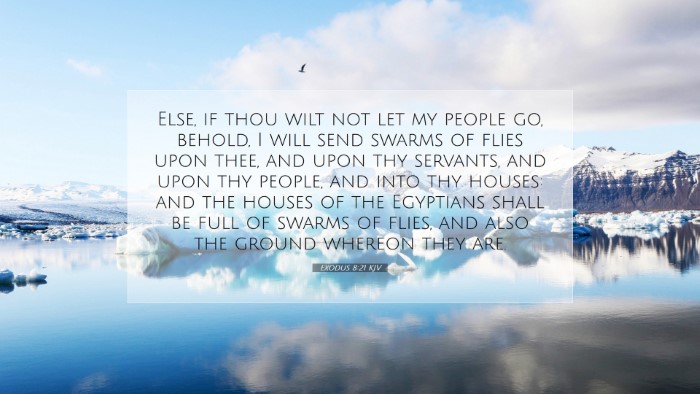Commentary on Exodus 8:21
The verse Exodus 8:21 reads:
"Else, if thou wilt not let my people go, behold, I will send swarms of flies upon thee, and upon thy servants, and upon thy people, and into thy houses: and the houses of the Egyptians shall be full of swarms of flies, and also the ground whereon they are."
Introduction
Exodus 8:21 is part of the narrative of the plagues, which God inflicted upon Egypt to compel Pharaoh to release the Israelites from slavery. This passage illustrates the significant themes of divine judgment, the power of God over nature, and the awakening of a hardened heart. Scholars and pastors alike can glean from the rich insights provided in various public domain commentaries, which explore the implications and theological dimensions of this verse.
1. Context of the Plague
In the context of Exodus, God had already brought several plagues upon Egypt, each designed to challenge the authority of Pharaoh and the Egyptian gods. Matthew Henry notes that the plagues were both a judgment on Egypt and a demonstration of God's omnipotence. The specific mention of flies here highlights a unique manifestation of God's control over creation.
2. The Nature of the Threat
Albert Barnes elaborates on the aspect of swarms of flies, which indicates a pestilential invasion that would disrupt daily life. This threat served both as a consequence for Pharaoh's obstinacy and as a means for God to reveal His power. The plagues were not merely natural phenomena but orchestrated signs intended to lead to repentance.
3. Symbolism of Flies
From a symbolic perspective, flies often represent filth and decay. Adam Clarke provides insight into how the swarms of flies could be seen as a contamination of the land. This brings a deeper understanding of moral and spiritual decay which results from disobedience to God. The essence of this can be related to the spiritual condition of the Egyptians and the need for purification.
4. Divine Authority and Pharaoh's Heart
This verse further emphasizes the divine authority of God and the hardened heart of Pharaoh. Matthew Henry reflects on Pharaoh's reluctance, suggesting it points to the human tendency to resist divine will. The repeated cycle of warning and consequence illustrates God's patience and the serious nature of disobedience.
5. God’s Protective Distinction
Barnes notes an important point regarding the divine distinction between the Egyptians and the Israelites. This highlights God’s mercy amidst judgment, a theme that runs throughout the plagues. In this particular context, the intention is to show that while judgment is universal, grace can be selective. This both comforts the faithful and warns the disobedient.
6. Application for Today’s Church
In contemporary application, this verse serves as a potent reminder of the consequences of ignoring God’s commands. Clarke suggests that the faithful ought to learn from Pharaoh’s folly—his failure to heed the warnings served to escalate the severity of his circumstances. Likewise, today's believers are encouraged to respond to God's leading rather than harden their hearts against His will.
7. Call to Repentance
This passage can be a call to introspection for church leaders and congregants alike. As they observe the relentless advance of sin and its consequences in society, it invites them to reflect on the condition of their hearts and the collective heart of the community they represent. It is a reminder that just as Pharaoh was warned time and again, so are modern-day individuals and communities called to repent before facing divine consequences.
8. Conclusion
Exodus 8:21 encapsulates critical themes of judgment, divine authority, and the human response to God’s sovereignty. The insights from Matthew Henry, Albert Barnes, and Adam Clarke enrich our understanding of this passage, presenting valuable lessons on obedience, repentance, and the nature of God’s dealings with humanity. As pastors, students, and theologians reflect on this text, they are compelled to consider the implications for their own lives and ministries in light of divine revelation.
9. Further Reflection:
- The nature of God’s authority: How do we see God’s sovereignty manifesting in our modern context?
- Responses to divine warning: In which areas of our lives are we stubborn like Pharaoh?
- The call to holiness: How does this passage challenge us to live a life distinct from worldly influences?


